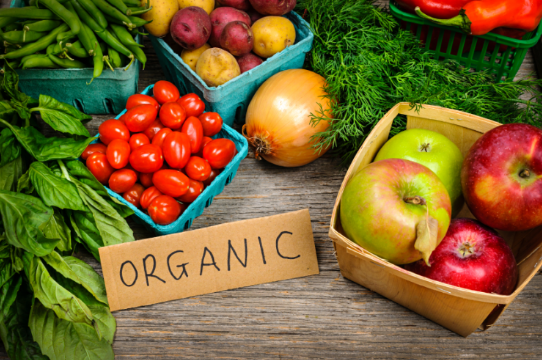8 Best Benefits Of Eating Organic Foods
Nowaday, more and more people are turning to organic foods as a means of leading a healthy lifestyle. Topfoodss acknowledges the importance of eating organic foods and the positive impact it can have on our well-being. Therefore, in this article, let’s explore the various benefits of eating organic foods and how they can contribute to a healthier and more sustainable way of life.
Contents
- 1 1.What exactly is organic food? Organic food usage trends
- 2 2. Types of Organic foods
- 3 3. Some benefits of eating organic foods
- 3.1 3.1. Disease prevention – one of benefits of eating organic foods
- 3.2 3.2. There are no genetically modified organisms in this product.
- 3.3 3.3. Excellent flavor – one of benefits of eating organic foods
- 3.4 3.4. Added nutrients – one of benefits of eating organic foods
- 3.5 3.5. Beneficial to the environment – one of benefits of eating organic foods
- 3.6 3.6. Improved impact on animal fertility
- 3.7 3.7. Food is less expensive – one of benefits of eating organic foods
- 3.8 3.8. Control of soil erosion – one of benefits of eating organic foods
1.What exactly is organic food? Organic food usage trends

Organic food is a notion that refers to foods that are cultivated or developed utilizing organic agricultural practices and standards, in which no artificial chemicals (pesticides, chemical fertilizers, preservatives, etc.), growth hormones, antibiotics, or genetically modified organisms are used.
Many consumers mistake organic food with clean food or home-grown food. Yet these are two quite distinct ideas.
Clean foods are those that are cultivated using methods that allow for the safe use of pesticides and chemical fertilizers. Items that wish to be recognized as organic food must go through extensive testing and certification.
2. Types of Organic foods
Organic farming and animal husbandry are not the only options. Organic food ranges from fresh vegetables, meat, fish, eggs, milk,… to processed foods like soda, biscuits, cereals,…
Organic plant-based foods: No synthetic fertilizers or pesticides are utilized. Farmers aim to conserve the environment by employing natural fertilizers such as chicken manure, sawdust, organic fertilizers, and biological disease control strategies such as crop rotation and intercropping with high-quality plants. repelling and destroying insects, insect protection,…
Animals raised for organic food: Organic animals are those that are kept in the open air and are given organic food without antibiotics or growth stimulants.
There are no artificial food additives such as preservatives and colorants in processed goods such as soda, cookies, cereals, and so on.
3. Some benefits of eating organic foods
3.1. Disease prevention – one of benefits of eating organic foods
According to several scientific studies, organic fruits and vegetables contain 40% more antioxidants than non-organic items. As a result, organic food is extremely beneficial in lowering the risk of heart disease, cancer, and excessive blood sugar.
3.2. There are no genetically modified organisms in this product.

Combining animal and plant DNA is against nature’s rules and can lead to disastrous effects. Employing biotech genes for manufacturing is more productive, but it adds needless genetic alterations into foods and has no health benefits. GMOs are not utilized in organic foods, thus there are some advantages.
3.3. Excellent flavor – one of benefits of eating organic foods
Organic foods are those that are cultivated and cultured in their natural state. As a result, they have a natural, firm, crunchy, and juicy flavor. Organic foods retain their natural smells and scents. This is a significant benefit of this sort of diet.
3.4. Added nutrients – one of benefits of eating organic foods

Nutrients are still kept in these meals since they are absolutely devoid of toxic chemicals.
3.5. Beneficial to the environment – one of benefits of eating organic foods
Apart from the health benefits, eating organic food offers several other advantages. The soil and water are not affected since these crops are farmed without the use of pesticides, insecticides, and other substances. Moreover, this form of manufacturing decreases pollution, boosts fertility, and uses less energy.
3.6. Improved impact on animal fertility
Non-organic and chemical-laden meals are one of the reasons of infertility in animals (including humans). Animals grown with organic components reproduce better than animals bred only with non-organic diet. Animals must be fed a 100% organic diet in order to produce organic eggs, meat, and dairy.
3.7. Food is less expensive – one of benefits of eating organic foods
Although some are more expensive, the vast majority of organic foods are affordable. You can simply cultivate clean veggies and fruits if you establish a kitchen garden. These meals help to avoid a variety of serious ailments, which can save you money on prescriptions.
3.8. Control of soil erosion – one of benefits of eating organic foods

Soil erosion is one of the most serious environmental problems facing the planet right now. Organic farming has the potential to save the planet from this crisis. Farmers are taught how to raise crops while protecting soil fertility and reducing erosion. This is one of the most significant advantages of eating organic food.
In conclusion, there are numerous benefits to eating organic foods, including improved nutritional content, reduced exposure to harmful chemicals, and a more sustainable food system. Incorporating organic foods into your diet can help to support overall health and wellbeing, and may even have specific benefits for those with diabetes.
Additionally, research has shown that bitter foods, such as bitter melon, can be particularly beneficial for managing blood sugar levels in those with diabetes. By choosing organic and bitter foods, individuals can take proactive steps towards improving their health and achieving a more balanced and nourishing diet.
I hope you find the information compiled above about benefits of eating organic foods useful. Have a nice day



